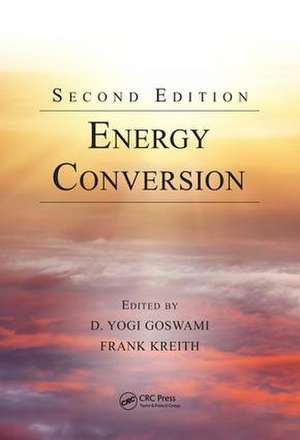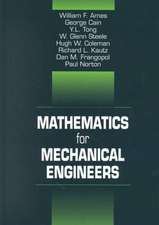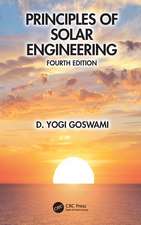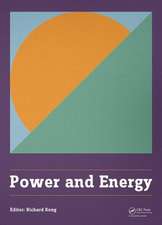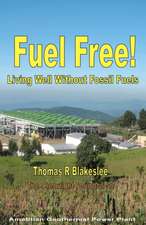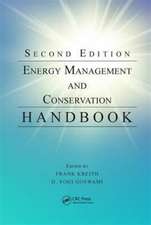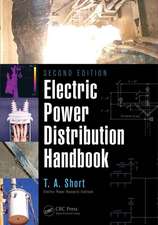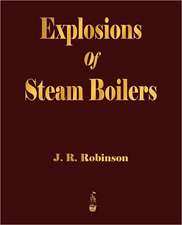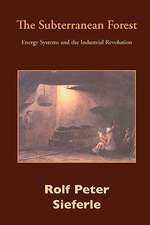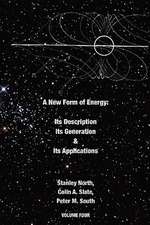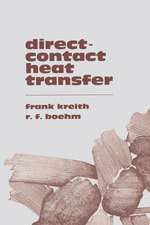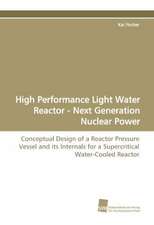Energy Conversion: Mechanical and Aerospace Engineering Series
Editat de D. Yogi Goswami, Frank Kreithen Limba Engleză Hardback – 22 iun 2017
Din seria Mechanical and Aerospace Engineering Series
- 9%
 Preț: 1147.84 lei
Preț: 1147.84 lei - 9%
 Preț: 1281.04 lei
Preț: 1281.04 lei - 18%
 Preț: 1806.82 lei
Preț: 1806.82 lei - 27%
 Preț: 1235.67 lei
Preț: 1235.67 lei - 28%
 Preț: 1045.42 lei
Preț: 1045.42 lei - 15%
 Preț: 591.84 lei
Preț: 591.84 lei - 15%
 Preț: 461.03 lei
Preț: 461.03 lei - 28%
 Preț: 1021.92 lei
Preț: 1021.92 lei - 29%
 Preț: 1099.44 lei
Preț: 1099.44 lei - 11%
 Preț: 319.68 lei
Preț: 319.68 lei - 29%
 Preț: 1059.23 lei
Preț: 1059.23 lei - 25%
 Preț: 857.50 lei
Preț: 857.50 lei - 15%
 Preț: 489.26 lei
Preț: 489.26 lei - 22%
 Preț: 352.95 lei
Preț: 352.95 lei -
 Preț: 516.42 lei
Preț: 516.42 lei -
 Preț: 275.87 lei
Preț: 275.87 lei - 15%
 Preț: 328.37 lei
Preț: 328.37 lei - 18%
 Preț: 867.06 lei
Preț: 867.06 lei - 18%
 Preț: 1238.86 lei
Preț: 1238.86 lei - 18%
 Preț: 896.13 lei
Preț: 896.13 lei - 18%
 Preț: 1012.58 lei
Preț: 1012.58 lei - 18%
 Preț: 1800.14 lei
Preț: 1800.14 lei - 15%
 Preț: 582.18 lei
Preț: 582.18 lei - 18%
 Preț: 1015.76 lei
Preț: 1015.76 lei - 18%
 Preț: 794.27 lei
Preț: 794.27 lei - 18%
 Preț: 1252.78 lei
Preț: 1252.78 lei - 18%
 Preț: 850.50 lei
Preț: 850.50 lei - 18%
 Preț: 1398.05 lei
Preț: 1398.05 lei - 18%
 Preț: 1138.99 lei
Preț: 1138.99 lei - 23%
 Preț: 721.54 lei
Preț: 721.54 lei - 28%
 Preț: 1263.49 lei
Preț: 1263.49 lei - 30%
 Preț: 2147.18 lei
Preț: 2147.18 lei - 29%
 Preț: 1997.82 lei
Preț: 1997.82 lei
Preț: 1321.65 lei
Preț vechi: 1835.49 lei
-28% Nou
Puncte Express: 1982
Preț estimativ în valută:
252.98€ • 274.88$ • 212.64£
252.98€ • 274.88$ • 212.64£
Carte tipărită la comandă
Livrare economică 21 aprilie-05 mai
Preluare comenzi: 021 569.72.76
Specificații
ISBN-13: 9781466584822
ISBN-10: 1466584823
Pagini: 1207
Ilustrații: 510
Dimensiuni: 178 x 254 x 51 mm
Greutate: 2.04 kg
Ediția:Revizuită
Editura: CRC Press
Colecția CRC Press
Seria Mechanical and Aerospace Engineering Series
ISBN-10: 1466584823
Pagini: 1207
Ilustrații: 510
Dimensiuni: 178 x 254 x 51 mm
Greutate: 2.04 kg
Ediția:Revizuită
Editura: CRC Press
Colecția CRC Press
Seria Mechanical and Aerospace Engineering Series
Public țintă
ProfessionalCuprins
Preface. Contributors. Global Energy Systems. Fossil Fuels. Biomass Properties and Resources. Municipal Solid Waste. Nuclear Resources. Solar Energy Resources. Wind Energy Resource. Geothermal Energy. Steam Power Plant. Gas Turbines. Internal Combustion Engines. Hydraulic Turbines. Advanced Fossil Fuel Power Systems. Stirling Engines. Nuclear Power Technologies through Year 2035. Nuclear Fusion. Energy Storage Technologies. Solar Thermal Energy Conversion. Concentrating Solar Thermal Power. Photovoltaics Fundamentals, Technology and Application. Wind Energy Conversion. Biomass Conversion Process for Energy Recovery. Geothermal Power Generation. Waste-to-Energy Combustion. Fuel Cells. Direct Energy Conversion. Appendix A: The International System of Units, Fundamental Constants, and Conversion Factors. Appendix B: Solar Radiation Data. Appendix C: Properties of Gases, Vapors, Liquids, and Solids. Appendix D: Ultimate Analysis of Biomass Fuels. Index.
Notă biografică
D. Yogi Goswami is a distinguished university professor and director of the Clean Energy Research Center at the University of South Florida. He conducts fundamental and applied research on solar thermal power and cooling, photocatalytic detoxification and disinfection, thermodynamics, third-generation photovoltaics, and hydrogen production and storage. Professor Goswami is the editor in chief of Solar Energy and Progress in Solar Energy. He has published as an author or editor 19 books and more than 375 refereed technical papers. He also holds 17 patents, some of which have been successfully commercialized.
Frank Kreith is professor emeritus of engineering at the University of Colorado, Boulder, USA. He received his MS in engineering from the University of California, Los Angeles, and his doctorate from the University of Paris in 1964. From 1953 to 1959 he was associate professor of mechanical engineering at Lehigh University, Bethlehem, Pennsylvania, USA. In 1959, he joined the University of Colorado, where he held appointments as professor of mechanical and chemical engineering. He was senior research fellow at the Solar Energy Research Institute, and has consulted for NATO, the U.S. Agency of International Development, and the United Nations. Dr. Kreith was recently awarded the Association of Engineering Societies’ 2016 John Fritz Medal for his achievements in the advancement of solar energy.
Frank Kreith is professor emeritus of engineering at the University of Colorado, Boulder, USA. He received his MS in engineering from the University of California, Los Angeles, and his doctorate from the University of Paris in 1964. From 1953 to 1959 he was associate professor of mechanical engineering at Lehigh University, Bethlehem, Pennsylvania, USA. In 1959, he joined the University of Colorado, where he held appointments as professor of mechanical and chemical engineering. He was senior research fellow at the Solar Energy Research Institute, and has consulted for NATO, the U.S. Agency of International Development, and the United Nations. Dr. Kreith was recently awarded the Association of Engineering Societies’ 2016 John Fritz Medal for his achievements in the advancement of solar energy.
Recenzii
The second edition of Energy Conversion is an excellent resource, as there is growing interest in the substitution of renewable energy sources for fossil fuels. The book is divided into two sections— "Energy Resources" and "Energy Conversion." The first section presents a good review of current energy sources such as fossil fuels, biomass, municipal solid waste, nuclear, solar, wind, and geothermal. Under each topic, the availability of the resources, production, transportation, and environmental features are discussed. The second section covers energy conversion from different technologies to power/work. Some of the topics covered in this section include gas turbines, internal combustion engines, hydraulic turbines, advanced fossil fuel power systems, nuclear fusion, energy storage technologies, solar thermal energy conversion, wind energy conversion, biomass conversion process, waste-to-energy combustion, fuel cells, and direct energy conversion. Each chapter offers a general review of the topic and relevant scientific fundamentals, followed by technology applications.
—CHOICE, March 2018
—CHOICE, March 2018
Descriere
This handbook surveys the range of methods and fuel types used in generating energy for industry, transportation, and heating and cooling of buildings. Solar, wind, biomass, nuclear, geothermal, ocean and fossil fuels are discussed and compared, and the thermodynamics of energy conversion is explained.
